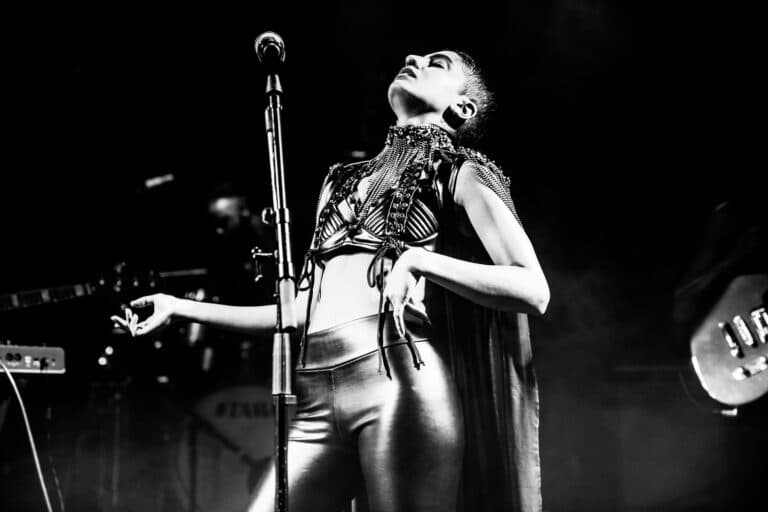30 Artists, 30 Years – Juliana Yazbeck
BF: The Bagri Foundation was privileged to have you perform in 2019 as part of Tales of the Silk Road series focussing on Lebanon. After everything that has been happening in Lebanon and the world in the past months it seems extremely difficult to bring the mind back to February 2019. If you could enter a time machine and go back to that night in London when we were all celebrating Lebanese culture together, what are the feelings, sounds, energies you would encounter?
I would encounter the biggest number of Lebanese people I’ve been around in years. Even then, it was a bittersweet realisation: that I am so displaced from my own people; that it is so rare for me to be surrounded by them. Being surrounded by your own people and your own culture almost smells different… like home. When I stepped out on stage, the room was brimming with an energy of familiarity. I felt so seen, so understood. I also got my period on stage that night, which always brings my emotions even closer to the surface, but I had no fear of being vulnerable. I felt safe, and that is a rare and beautiful experience for an artist on stage.

BF: In your work you blend languages, music genres, poetry and meditative sounds in a cross-cultural and cross-geographical approach. You’ve said before that is also part of your own personal history as an artist who was born in the USA to asylum-seeking parents fleeing the Lebanese Civil War, then who moved to Lebanon, before landing to London. How do you think this continuous crossing of disciplines and geographical borders have influenced your work? Has your approach to writing music and poetry changed during this period of lockdown and social distancing?
Like my work, I am more than the borders I’ve crossed and the cultures I’ve belonged to. Cross-cultural genre-bending music is bigger and more complex than the music industry itself, which can be reductionist and limiting. Yet my work has shown me that so many others share similar needs to mine and have had similar journeys, and that has been a beautiful discovery. It has shown me that we are not alone, we are many, we are complex, and we are strong.
During lockdown, I initially began a daily writing routine, thinking this was a great opportunity for me to create new material. But as I dug deeper, I understood: This was not an opportunity to churn out a new album. It was an opportunity to implement deep and real change in how I work, how I show up in the world, what I contribute, and how I prioritise my own wellbeing at the centre of it all. Too often as women of colour, we sing our own liberation while being overworked, exploited, and burnt out. No more. I have spent the past months facing my own complicity in this unhealthy cycle. My work during this pandemic has been deep and difficult but real and true to my beliefs. I do not know what my “new” way of living and working will look like, but I do know for certain that I am shedding old cycles and indoctrinated patterns. And that will bring its own liberation, its own empowerment, and its own art.
AC: When we started this series back in May, we wanted to ask our interviewees to tell us more about their plans for the future. With the creative sector increasingly under threat by closure of venues and reduced capacity, not to mention worldwide unrest, what advice would you give to fellow artists to keep nurturing their inspiration and drive to create? Has there been any particularly inspiring individuals for you during this time?
At the start of lockdown, I expressed to my friend and colleague Marwa Asserraji, fashion stylist extraordinaire (look her up; she’s amazing!), that I felt useless, that I wanted to help out, to go out there and save lives, but that as an artist I was unsure how.
She responded, “You are helping. Your art keeps us sane. It keeps us alive. It gives us hope.” Her words have stayed with me and will stay with me forever.
It can be so difficult for artists to hold onto the truth of why we do what we do, when we live in a world where money is not only valued above everything else, but necessary for survival. Yet this struggle also reminded me that as artists we are the value of our art and what we contribute to the wellbeing of the world. How can someone else decide my worth, or any artist’s? They can’t. Moving forward, we must hold onto the true value of what we bring to the table. I certainly intend to.

Biography
Born to Lebanese parents, Juliana draws on her mixed cultural upbringing to create her signature sound: an unlikely but mesmerising fusion of spoken word, otherworldly electronics, and haunting vocals. Juliana recently played the iconic Electric Ballroom in Camden, London. Juliana’s recent highlights also include being shortlisted for the Arab British Centre’s Award for Culture, headlining Liverpool Arab Arts Festival (Royal Court, Liverpool) and Shubbak Festival (National Theatre, London), as well as playing a double bill show with Sudanese American artist AlSarah And The Nubatones (ULU, London).
Interviewed by Alessandra Cianetti, Project Manager – Sept 2020


